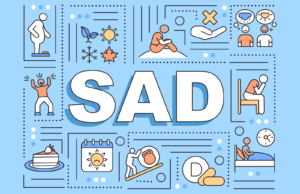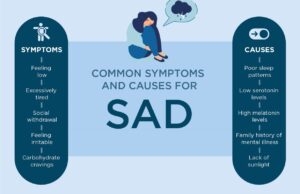Know the Signs of S.A.D.
Winter can bring seasonal depression
Sometimes depression can change your view of the world, making everything seem hopeless. Depression can make you feel utterly alone. But no one is alone: about 14 million Americans are depressed every year. One type of depression is common during the winter season, seasonal affective disorder (SAD).
SAD is a type of depression that can affect a person during the same season each year. If you get depressed during winter but feel more “alive” during spring and summer, then you may have SAD. SAD is still a major type of depression, so someone with it could be just as depressed as someone with regular depression. The only difference between the two is that SAD occurs at a specific time.
Most symptoms of SAD start in fall and occur throughout winter. Some of the symptoms include loneliness, anxiety, loss of energy, starting to become antisocial, over/under sleeping, loss of activities once enjoyed and weight gain/loss. People who live in places with longer winter nights are at a higher risk for SAD.
The main cause for SAD is still unknown, but most doctors say that it’s because of your circadian rhythm (your body’s biological clock). The reduced level of sunlight in fall and winter may mess with your body’s internal clock, which lets you know when you should sleep or be awake. This disruption of circadian rhythm may lead to feelings of depression.
One treatment for SAD is a technique called light therapy. In light therapy, also called phototherapy, you sit a few feet from a light therapy box so that you’re exposed to bright light. Light therapy mimics outdoor light and appears to cause a change in brain chemicals linked to mood.
Light therapy is one of the best treatments for seasonal affective disorder. It generally starts working in two to four days and causes few side effects. Research on light therapy is limited, but it appears to be effective for most people in relieving seasonal affective disorder symptoms. Other forms of treatment for SAD include psychotherapy and medications.
Most students, even here at Cedar Falls High School, say that a main cause to their depression during winter is from all of the stress from school. Studying for finals, trying to maintain or improve grades, having a job, etc; “binge” studying can cause stress, and a good way to manage studying and maintain levles of low stress is to organize and to divide out what to study and when to do it. It may seem ridiculous, but it’ll decrease all the stress that is being thrown at students.
Another reason why SAD is common for teens is because teens’ circadian rhythm seems to shift from a morning preference to an evening preference as they enter or have gone through puberty. Their internal clocks are out of sync with their early morning schedules. It’s been proven that teens have more energy and are willing to learn around noon.
A few psychiatrists who had continued and gone deeper in research on SAD include Dr. Norman Rosenthal and Dr. Steven Targum. Dr. Rosenthal, in his book called “Winter Blues: Seasonal Affective Disorder: What it is and How to Overcome it,” said, “Every year, as the days become short and dark, people with SAD develop a predictable set of symptoms. They slow down and have a hard time waking up in the morning. Their energy level decreases, they tend to eat more, especially sweets and starches, and they gain weight. Their concentration suffers, and they withdraw from friends and family. As you can imagine, their work and relationships suffer, and they can become quite depressed. This symptom cluster often lasts for four or five months until the days become longer again. Since the syndrome is linked to a lack of light, people with SAD may become depressed during cloudy weather at any time of year, or if they are confined to windowless offices or basement apartments.”
The book also states other ways besides light therapy, to help overcome and survive SAD. Some of these include, exercise and a healthy diet.









You must be logged in to post a comment Login